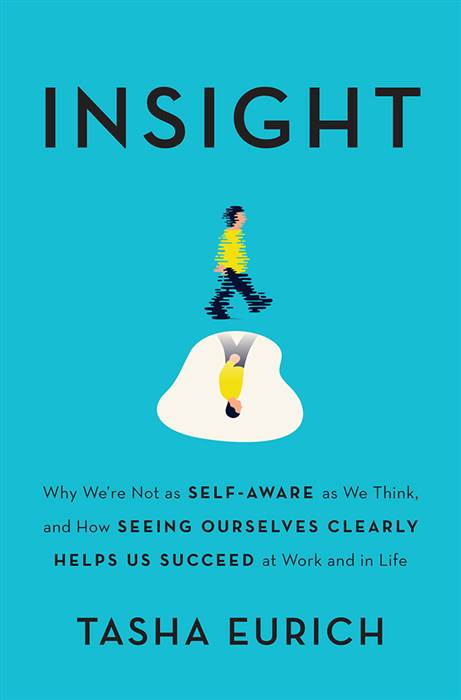Lifestyle – My husband just so happens to be a giant nerd, which is precisely why I married him. By day, he geeks out as an IT systems architect at an engineering firm, and by night, among other things, he geeks out about astronomy.

Insight: Why We’re Not As Self-Aware as We Think, and How Seeing Ourselves Clearly Helps Us Succeed at Work and in Life – Photo Crown Business
One weekend, we were up at our cabin in the Colorado mountains. It was a crisp, clear night, and I figured the telescope would be coming out at any moment. When I heard the back door slam shut, I prepared myself for the inevitable “Hey, come look at this!” After a while, having heard no such exclamation, I decided to go check on him. I was surprised to find him just sitting there, staring up at the sky with the telescope still in its carrying case next to him.
“Is your telescope broken?” I asked in horror.
Chuckling, he reassured me that it wasn’t. “Once I got out here and my eyes adjusted,” he explained, “I started looking at all the constellations — do you see how beautiful the Milky Way is tonight?” Still sensing my confusion, he opined, “Sometimes it’s really nice to take a step back and look at the bigger picture.”
The same is true for self-examination. The “life story” approach helps you look backward to learn how the sum total of your past shaped you. If each life event is a star, our life story is the constellation. And if we spent all of our time looking at individual stars through a telescope lens, we couldn’t appreciate the magnitude and beauty of the constellations that dot the sky. To that end, the process of becoming, as Timothy Wilson describes it, “biographers of our lives” is a profoundly powerful but surprisingly underutilized approach to better understand who we are, who we are becoming, and who we could be.
How to Use Your Life Story to Make Sense of Your Past and Future
Psychology professor Dan McAdams has been prolifically researching life stories for more than 30 years. The approach that McAdams and his colleagues use to help people compose their life stories goes something like this:
Think about your life as if it were a book. Divide that book into chapters that represent the key phases of your life. Within those phases, think of 5-10 specific scenes in your story—high points, low points, turning points, early memories, important childhood events, important adulthood events, or any other event you find self-defining. For each, provide an account that is at least one paragraph long:
- What happened and when? Who was involved?
- What were you and others thinking and feeling, and why was this event especially important for you?
- What does this event say about who you are, how you have developed over time, or who you might become?
- When you are finished writing your account, take a step back and look at your life story as a whole:
- What major themes, feelings, or lessons do you see in your story?
- What does the story of your life say about the kind of person you are and might become?
- What does your story say about your values, passions, aspirations, fit, patterns, reactions, and impact on others?
After collecting life stories from tens of thousands of people, professor McAdams and his colleagues have learned that they usually have overarching themes running through them. Identifying such themes can help make sense of seemingly contradictory aspects of ourselves. Let’s look at the example of Chase, an introverted non-profit fundraiser who loves his work. His pattern of introversion and a passion for a job that requires him to frequently schmooze might seem incongruous at first. But when Chase examines his life story, he notices that every high point has involved “doing good” for someone who was less fortunate. So even though his job requires more mixing and mingling than an introvert might usually prefer, it allows him do what is most important to him: help others. And if that involves a little socializing, Chase is happy to do it.
Research shows that self-aware people tend to knit more complex narratives of their key life events: they are more likely to describe each event from different perspectives, include multiple explanations, and explore complex and even contradictory emotions. In many ways, this complexity is the opposite of the need for absolute truth; instead of searching for simple, generalizable facts, self-aware people appreciate the complicated nature of their life stories. Perhaps for this reason, complex life stories are associated with continued personal growth and maturity years into the future.
At the same time, we also want to seek something called thematic coherence. When we’re able to find consistent themes across multiple important events of our lives, we can glean surprising self-insights. Common themes include achievement (i.e., personal success), relationships (i.e., forming and keeping connections with others), and growth (i.e., seeing life as an opportunity to develop and improve). Another especially interesting life-story theme is one that McAdams has focused on for much of his career: the theme of redemption. Whereas people with “contamination sequences” see a pattern of good things turning to bad ones, people with “redemption sequences” believe that bad things can turn to good.
One particularly moving example of a redemption sequence involves a young man from one of McAdams’ studies — let’s call him James — whose life has been fraught with hardship. Entering the world as a product of rape, James faced challenge after challenge, including a near-death experience after being stabbed. But where many would see only darkness and despair, James sees hope: “I was dead, but the doctors brought me back . . . My philosophy of life has always been to be positive instead of negative on any circumstances you deal with. If you get involved in the negative, you’ll drown.” It would be easy to label James as overly optimistic. But the research on people like him paints a clear picture: if we view our challenges accurately and as an opportunity for redemption, even the most horrific experiences can help us learn, grow and improve.
So when the time is right for you to write your life story, don’t look at it as a neat, clean Hollywood narrative. Embracing the complexity, the nuances and the contradictions will help you appreciate your inner reality in all its beautiful messiness.
Reprinted from INSIGHT: Why We’re Not as Self-Aware as We Think, and How Seeing Ourselves Clearly Helps Us Succeed at Work and in Life © 2017 by Tasha Eurich. Published by Crown Business, an imprint of Penguin Random House LLC.

